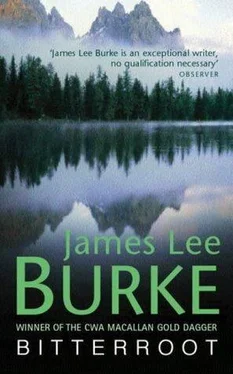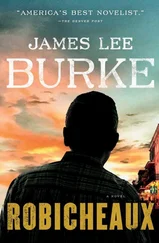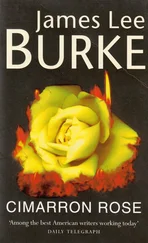"Is there anything else you want to tell me?" he asked.
"No, sir."
He placed one hand on my shoulder. "You all right, partner?" he said.
"Right as rain," I said, hoping he would not hold my lie against me.
That afternoon a waxed black car drove through the field behind Doc's house and parked in front, the sunlight wobbling like a yellow flame on the tinted windows.
Amos Rackley, the ATF agent, got out of the passenger seat and knocked on the door with his fist, rattling a picture on the wall. He wore shades and a dark suit that seemed to contain and intensify the heat and energy in his body. His gum snapped in his mouth and his jawbone was slick with perspiration.
When I opened the door, he said, "It must be the genes."
"What?"
"Your family. Like a stopped-up commode that keeps overflowing on the floor. First I have trouble with you. Now your kid."
"What are you talking about?"
"We sent somebody to ring the doorbell at a certain Indian gal's house. Guess who answers the door?"
"Lucas?"
"Not wearing shirt or shoes. With long red scratches on his back. I'm surprised he took time to zip his fly."
"You guys should have had jobs at Salem in 1692. You would have fit right in," I said.
"You listen, you arrogant prick…"
But he was so angry he couldn't talk. He took the gum out of his mouth and stuck it on a post and opened a folder full of eight-by-ten photographs. They showed blood-streaked people being lifted from rubble, a woman crying with a dead child in her arms, a white police officer giving mouth-to-mouth to a black man on a stretcher.
"That's the Alfred P. Murrah Building, motherfucker," he said. "I'm betting my career this shit goes back to Hayden Lake, Idaho. But you and now your son have decided to factor yourself in, either because you've got cooze on the brain or you just can't stand to let things alone. So why don't we just walk out in the woods here, you and me, and see what develops? I can't tell you how much I'd enjoy that."
I stepped out on the porch. The day was bright, the wind cold on my face in the shade.
"My son has nothing to do with your investigation. His interest in Sue Lynn Big Medicine is romantic. You were that age once. Why don't you show a little empathy?" I said.
"That's a great word coming from a disgraced Ranger who killed his own partner. I changed my mind about you, Mr. Holland. I wouldn't dirty my hands fighting a man like you. You turn my stomach."
When he drove away I could feel my eyes filming, the ridgeline and ponderosa and cliffs distorting into green and yellow shapes. I wanted to turn and see L.Q. standing by the barn or down in the shade of the cottonwoods by the river or perched atop a rail by the horse lot.
"L.Q.?" I said.
But there was no reply except the wind in the trees.
Toward evening Maisey and I saddled the Appaloosa and thoroughbred that Doc boarded for his neighbors and rode them up a switchback logging road in the hills behind the house. In the distance we could see old clear-cuts and burned stumps along the sides of the Rattlesnake Mountains.
"I overheard what that Treasury agent said to you this morning, Billy Bob. Why'd you let him get away with that?" she said.
"He lost his friends in Oklahoma City. He can't do anything about it, so he takes his grief out on others. That's the way it is sometimes."
"My father says under it all you're a violent man."
"I have been. That doesn't mean I am today."
"The sheriff called this morning. He wants to talk to my father again."
"What for?"
"The third man who raped me is dead. I'm glad. I hope he suffered when he died," she said. Her face was narrow with anger, her mouth pinched with an unrelieved bitterness.
"Maisey, I can't argue with your feelings, but-"
"Don't say anything, Billy Bob. Just please don't say anything."
She turned her horse away from me and rode into the shade, then dismounted and began picking huckleberries and putting them into her hat, even though they were green and much too sour to eat.
Down below I saw the sheriff's cruiser pull into the yard.
I rode the thoroughbred down the hill and took off my hat and looked at the greenness of the country and grinned at the sheriff and waited for him to explain the cloud in his face.
"I don't care to look up at a man on horseback," he said.
I got down from the saddle and hung my hat on the pommel and tied the reins to the porch railing. I let my hand trail off the thoroughbred's rump, my eyes fixed on the sheriff's.
"Where was the good doctor yesterday afternoon?" he said.
"I don't know. Ask him," I replied.
"I would. If I could find him." The sheriff stood by the open door of his vehicle, his face cut by light and shadow, the wind flapping his coat. "The third suspect in Miss Voss's rape was pulled out of a river two days ago in Idaho. He had chest waders on and was submerged standing up in the bottom of a pool like a man with concrete boots on."
"Sounds like an accident to me," I said.
"Except he wasn't carrying no fishing gear, never owned a fishing license, and was never known to fish. Also, most sane people don't wear chest waders in July."
"Well, we'll all try to feel as bad as possible about his passing, Sheriff."
"I love to hear you talk, Mr. Holland. Every time you open your mouth I'm convinced this is indeed a great country, that absolutely any little dimwit can become an attorney. Tell Dr. Voss to call me before I come out here and put him in handcuffs."
I watched his cruiser drive across the field behind the house, then disappear down the dirt road. A half hour later my head was still pounding with his remarks. I called him at his office.
"Did you bother to check out this kid Terry Witherspoon?" I asked.
"The voyeur? Yeah, I did. He says he never looked in Maisey Voss's window and was never on her property."
"What did you expect him to say? Did you lift any prints off that gas can?"
"Lab work on peeping Tom complaints? Yeah, we got time for that. When we ain't busting up crack labs and trying to keep them goddamn Crips out of here."
"I really don't like being your straight man, Sheriff."
"Son, you were born for it. Lord God, I wish you people would move to Los Angeles," he said, and hung up.
Temple Carrol picked me up at Doc's house the next morning, and we drove into Missoula for breakfast. She wore khakis and scuffed boots and a yellow pullover, and because of her short height she steered with her chin tilted slightly upward. She was one of those women whose contradictions made both her admirers and her adversaries misjudge her potential.
Her eyes were a milky green that changed color when she was angry, as though dark smoke swam inside them, and she had a distracting habit of chewing gum or piling her hair on top of her head while I talked to her, as though she were not listening. Then I would discover days later she could repeat a conversation back to me, word for word, and accurately correct my own memory of it.
She kick-boxed on a heavy bag every day at a gym in Deaf Smith and could touch the floor with the flats of her hands. She was often dirty from work in her garden, the seat of her shorts grass-stained, her hair full of leaves, her body glowing with sweat and the smell of crushed flowers. She cared nothing for other people's opinions, thought politics were foolish, kept guns all over her house, and fed every stray animal on the west side of the county. Anyone who mistook her eccentricities for weakness and crossed a line with her did so only once.
As I looked at the pinkness of her skin, the baby fat on her arms, the way a strand of her chestnut hair kept blowing in her eye, I wanted to touch her, to place the back of my hand on the heat of her cheek, to rest my arm across her shoulders. As she drove along the river, through the blueness of the morning, her profile and the angle of her mouth contained all the innocence and loveliness of a high school girl waiting to be kissed, and I felt ashamed of my own impulses and all the times I had been cavalier about her loyalty and friendship.
Читать дальше












